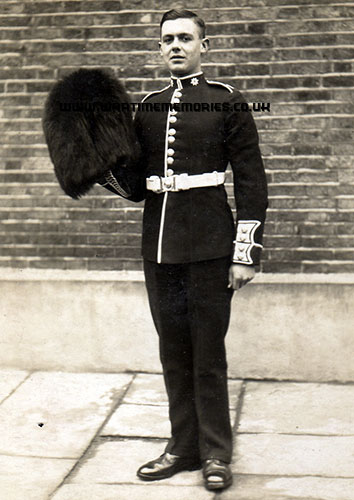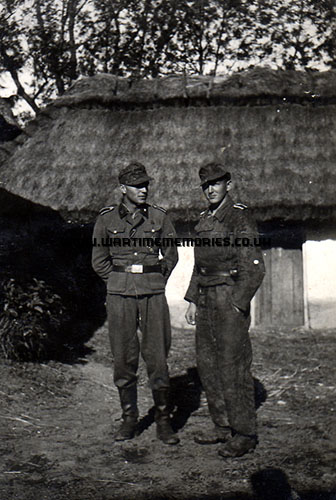Sgt. Alfred "Tom" Thomas
British Army Coldstream Guards
from:Beverley
My father Alfred Thomas served in Palestine before the war. On 13th April 1939 he was back in Egypt, where he stayed until another tour of duty in Palestine starting on 27th of May 1940. With the Second World War now well under way, Tom was posted back to Egypt on 27th of June 1940 to face the Italians and, later, Rommel's Afrika Korps.
The Italians under Marshal Graziano launched a limited invasion of Egypt in September 1940, going as far as Sidi Barrani about 50 miles across the border from Libya, where they stopped and fortified the area. This gave General Wavell time to reorganise his forces before going on the counter-attack in Operation Compass, which began on the 7th/8th December 1940 and lasted until 7th February 1941. At that point, the Italians having lost, Sidi Barrani, the port of Bardia, Tobruk, and Benghazi surrendered south of Beda Fomm. During Operation Compass, 133,298 Italian soldiers were captured along with a large number of guns and tanks. The British now halted their attack, having to send troops to Greece. On 12th of February, Rommel flew to Tripoli ahead of his troops, who arrived on the 14th. Rommel almost immediately went on the offensive and by 24 March had taken El Agheila, which was the leading British position. He then advanced on Mersa el Brega, which fell on 31st of March. The British were by now in chaotic retreat with Benghazi falling on 4th of April. The only place holding out against Rommel’s forces was Tobruk.
My father probably fought in both campaigns, but it was during the retreat from Rommel's forces that on 27th of May 1941 he was reported as missing and only later as having been taken prisoner. It is possible that this was while defending the Halfway Pass from the German advance. My father rarely talked about his wartime experience, but he did believe that he remained alive when taken prisoner due to the fact that Rommel showed up around that time, which ensured that prisoners were treated correctly.
Prisoners of war tend to be written out of history apart from a few sensational cases of escape. These escapes were rarely successful and the reprisals could be life threatening. Many POWs were traumatised by their experiences and treatment, along with feelings of guilt for being captured. The first record of Tom, after he was shipped out of North Africa to Italy, was of being interned in Italian POW camp number 66. This camp was in Capua, a few miles south of Naples. It was situated on a vast plain that offered views of the Vesuvius volcano. When the Allies invaded Sicily on 10 July and Southern Italy on 3rd of September 1943, POWs would have been moved north as the Allies advanced. Apparently, when the Italians stopped their participation in the war, they withdrew their guards from the POW camps. This gave an opportunity for prisoners to escape. However, a secret branch of the Ministry of Defence (known as MI9) ordered that British POWs in Italy should remain in their camps after Italy surrendered. Many senior officers within the camps enforced this. As a result of this, the German army was able to walk into dozens of camps and round up the POWs.
Eventually, Tom ended up in Poland at Stalag 344 Lamsdorf (formerly Stalag VIIIB) in Silesia. This was a large German POW camp located in the small town of Lamsdorf, now called Lambinowice in Poland, that was initially built during WW1 to house French and British prisoners. His POW number was 30702.

